| Unity Day | |
|---|---|
 | |
| Official name | Day of People's Unity |
| Observed by | Russia |
| Significance | The expelling of Polish–Lithuanian occupation forces from Moscow in November 1612, the end of the Time of Troubles and the turning point of the Polish-Russian War (1605–1618) |
| Celebrations | Flag hoisting, parades, fireworks, award ceremonies, singing patriotic songs and the national anthem, speeches by the President, entertainment and cultural programs |
| Date | 4 November |
| Next time | 4 November 2024 |
| Frequency | Annual |

Unity Day, also called the Day of People's Unity or National Unity Day (Russian: День народного единства, romanized: Denʹ narodnogo yedinstva), is a national holiday in Russia held on 4 November [O.S. 22 October]. It commemorates the popular uprising which expelled Polish–Lithuanian occupation forces from Moscow by a militia from Nizhny Novgorod in November 1612, and more generally the end of the Time of Troubles and turning point of the Polish-Russian War (1605–1618).
The day's name alludes to the idea that all classes of Russian society united to preserve Russian statehood when there was neither a tsar nor a patriarch to guide them. In 1613 tsar Mikhail Romanov instituted a holiday named Day of Moscow’s Liberation from Polish Invaders.[1] It was celebrated in the Russian Empire until 1917, when it was replaced with a commemoration of the Russian Revolution. Unity Day was reinstituted by the Russian Federation in 2005, when the events of the year 1612 have been celebrated instead of those of 1917 every 4 November since. The day is also the feast day of the Russian Orthodox icon of Our Lady of Kazan.
History
One of the initiators of the establishment of the holiday was Vladislav Surkov:
What is the Russian world? I once introduced this idea into the structure of state policy when we changed ideological dates: we canceled the day of celebration of the socialist revolution and introduced National Unity Day. In Russia, no holiday was associated with events before the Revolution. This day became the day of Russian nationalism in its essence. There was such a task: how to talk about the Empire, about our desire to expand, but at the same time not offend the ears of the world community.[2]
On 29 September 2004, Patriarch Alexy II of Moscow publicly supported the initiative of the Duma to establish 4 November as Unity Day, stating, "This day reminds us how in 1612 Russians of different faiths and nationalities overcame division, overcame a formidable enemy and led the country to a stable civil peace."[3]
On 4 October, the initiative was publicly supported by the first deputy head of the United Russia faction, Valery Bogomolov. In an interview with RIA Novosti, Bogomolov stated that "in 1612, Russia was freed from the Polish invaders, and the 'times of unrest' ended."
On 28 October 2004, in Saratov on Teatralnaya Square, on the initiative of the Public Chamber of the region and the Youth Parliament of the region, an 8,000-strong rally of youth and representatives of public organizations was held in support of the course of reforms carried out by the President of the Russian Federation Vladimir Putin. The speeches voiced support for the initiative to establish the celebration of 4 November as the Day of National Unity, which was included in the Address of the rally participants to President Putin.
On 23 November 2004, a bill was submitted to the State Duma for consideration of amendments to the Labor Code of the Russian Federation: the abolition of the celebration of 7 November - the anniversary of the Great October Socialist Revolution and 12 December - Constitution Day, an increase in the New Year holidays from 2 to 5 days, as well as the introduction of a new holiday on 4 November. The bill's authors are Valery Bogomolov, Oleg Yeremeev (United Russia), and Vladimir Zhirinovsky (Liberal Democratic Party of Russia).
The Duma adopted the bill in the first reading. The communists opposed it.
On 27 December 2004, the draft was adopted in the third reading and became law. 327 deputies voted in favor, 104 (all communists) voted against, two abstained.
Events
2005
The center of the first of the revived tradition was Nizhny Novgorod, where monument to Kuzma Minin and Dmitry Pozharsky and Vladimir Putin laid flowers. The Patriarch of Moscow and all Rus', Alexy II was also in attendance. Activities in Moscow, included two processions and a "Russian March". Religious processions occurred with local heads of administration in attendance. Fundraisers were held in Tula, a district art festival occurred for children with disabilities, and in Kaluga, veterans and orphans were given local confectionery products.
2006
A Russian March took place, despite bans in cities such as Moscow. A ninety-minute show involving more than a thousand actors was staged in Nizhny Novgorod.
2007
1612, Vladimir Khotinenko's historical film dramatizing the event the holiday commemorates, was released on November 1. Thirty-nine events were held in Moscow alone. Vladimir Putin laid flowers at the monument to Minin and Pozharsky and presented the Pushkin Medal at a reception in the Moscow Kremlin, "for the preservation of Russian spiritual heritage" and "promotion of the Russian language".
2008

President Dmitry Medvedev laid flowers at the monument to Minin and Pozharsky and organized a reception in the Grand Kremlin Palace. In Revolution Square, 7,000 attended a meeting devoted to the Day of National Unity. Activists of the youth movement "Nashi" called for a day of "under the covers" - 10,000 young people gathered on Vasilevsky Descent Square to sew a patchwork of thousands into the so-called "blanket the world". There was a free rock festival "Call", aimed at combating negative phenomena among young people, such as drugs.
2010
A celebration was held of the consecration of the restored gate icon of St. Nicholas Mozhaiskogo on the Nikolskaya Tower of the Moscow Kremlin, with the participation of the Patriarch of Moscow and all Rus', Kirill I.
Reception
According to a poll in 2007, only 23 percent of Russians know the name of the holiday, up from 8 percent in 2005. 22 percent identified the holiday as the Day of Accord and Reconciliation, the name of the holiday on 7 November during the 1990s. Only 4% knew that the holiday commemorates the liberation of Moscow from Polish invaders, and in 2005, only 5%. [4]
President Vladimir Putin reestablished the holiday in order to replace the commemoration of the October Revolution, known as the Day of Great October Socialist Revolution during Soviet period and as the Day of Accord and Conciliation in post-Soviet times,[5] which formerly took place on 7 November. His decision angered some sections of the public,[6] particularly the Communist Party, who continued with celebrations on 7 November. Putin's predecessor, Boris Yeltsin took a limited action of changing the name of the holiday; by completely removing it, Putin initiated a controversy that continues to this very day.
See also
- Public holidays in Russia
- Russian march
- 1612, a historical film dramatizing the purpose of Unity Day
- Unity Day (disambiguation), in other countries
References
- ↑ "Russia Newsroom article". Archived from the original on 2011-11-27. Retrieved 2012-11-04.
- ↑ "⚡️ЧВК Пегов⚡️Сурков и Бородай о будущем ЛДНР, Украине, Боинге, Байдене и чиновниках⚡️ - YouTube" [⚡️PMC Pegov⚡️Surkov and Boroday about the future of the LDPR, Ukraine, Boeing, Biden and officials⚡️ - YouTube]. YouTube. Archived from the original on 2021-06-24. Retrieved 2021-06-17.
- ↑ "Kazan Icon of the Mother of God, day of celebration, meaning, photo. Holidays Kazan summer and Kazan winter (autumn)". 499c.ru. Archived from the original on 2023-11-25. Retrieved 2023-11-24.
- ↑ "The Moscow Times".
- ↑ "Trinity College Page". Archived from the original on 2007-06-29. Retrieved 2012-11-04.
- ↑ For example, see Акция против дня «Народного единства» Archived 2010-03-06 at the Wayback Machine